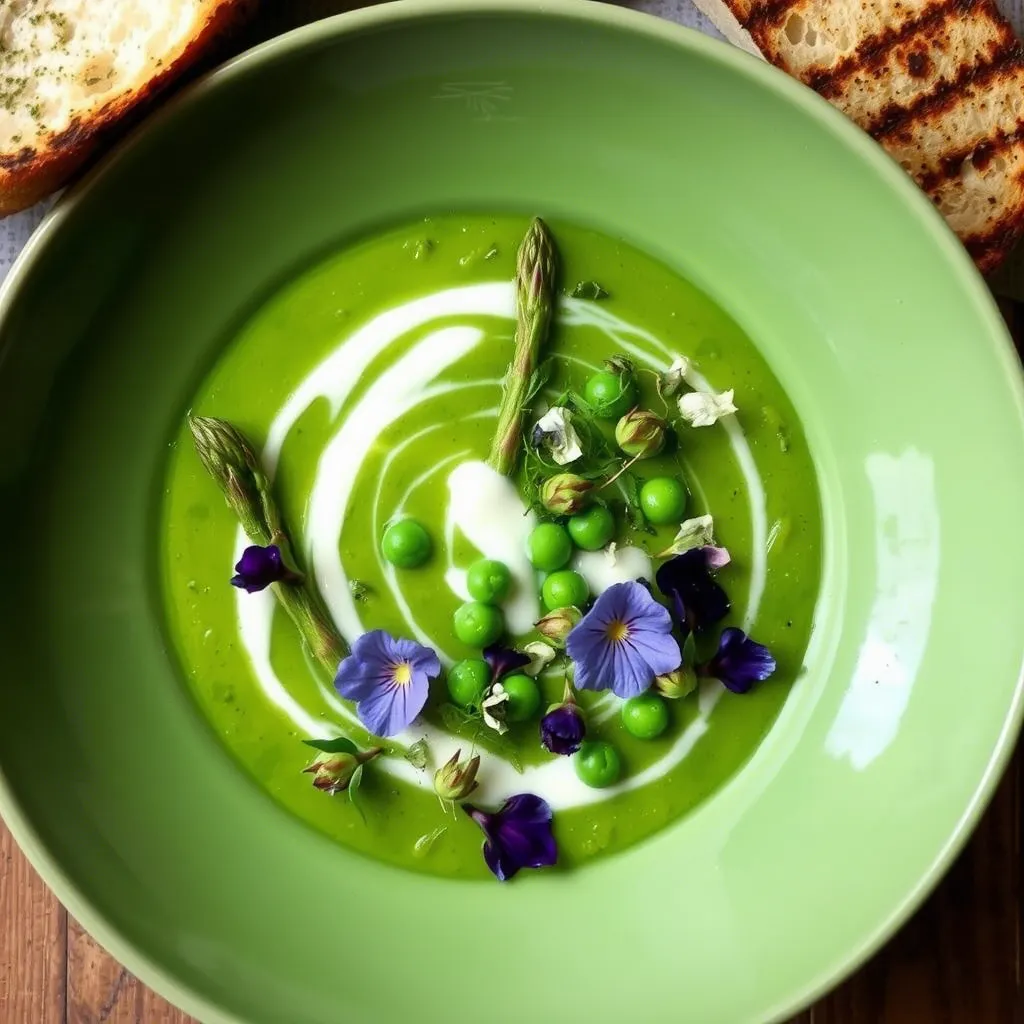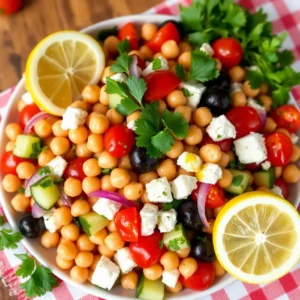Why You’ll Love This Lemon Herb Grilled Chicken
There’s something magical about that first spring evening when it’s finally warm enough to fire up the grill again. The windows are open, a gentle breeze carries the scent of fresh herbs from the garden, and dinner becomes an event rather than just another meal to check off your to-do list. This herb grilled chicken with spring vegetables is my celebration of that magical moment—a bright, vibrant dish that signals the end of heavy winter meals and welcomes the fresh flavors of spring.
As a busy parent, I know the dinner struggle is real. Between after-school activities, homework help, and trying to maintain some semblance of order in your home, the last thing you need is a complicated recipe with seventeen steps and ingredients you’ve never heard of. That’s where this lemon herb grilled chicken swoops in like a superhero in an apron. It’s simple enough for a Wednesday night but special enough for weekend guests who drop by “just to say hello” (and mysteriously appear right around dinnertime).
The marinade does double duty—it infuses the chicken with incredible flavor while also tenderizing it, resulting in juicy, perfectly cooked chicken breasts that won’t leave you reaching for a glass of water after every bite. Trust me, dry chicken is a culinary crime I refuse to commit! The herbs and lemon create a fragrant, bright flavor profile that even picky eaters find irresistible. My nephew, who normally considers ketchup a vegetable, cleans his plate whenever I make this—it’s that good.
What makes this recipe truly weeknight-friendly is how it comes together on a single sheet pan (or grill, if weather permits). The vegetables roast alongside the chicken, soaking up all those wonderful herb-infused drippings. It’s the kind of efficient cooking method that lets you help with math homework or pour yourself a well-deserved glass of wine while dinner practically makes itself.
The vibrant colors of this dish also make it Instagram-worthy without any fancy food styling tricks. In our house, we eat with our eyes first, and this light dinner offering is a feast of yellow lemon slices, green herbs, colorful spring vegetables, and golden-brown chicken. It’s a welcome change from the monochromatic comfort foods that carried us through winter.
If you’re trying to eat healthier without sacrificing flavor (aren’t we all?), this herb grilled chicken hits all the right notes. It’s naturally gluten-free, packed with lean protein, and loaded with seasonal vegetables that bring both nutrients and flavor to your plate. The olive oil provides healthy fats that keep you satisfied, while the herbs and lemon mean you can go light on salt without compromising taste.
Perhaps the best part? You’ll have dinner on the table in under 45 minutes, including prep time. In my book, that’s what I call a weeknight win. And if you’re really ahead of the game, you can marinate the chicken the night before, making your future self very grateful indeed.
The Story Behind This Lemon Herb Grilled Chicken
This lemon herb grilled chicken recipe was born out of necessity—the mother of all kitchen inventions—during a particularly chaotic season of life when my children were small, my work deadlines were tight, and my capacity for elaborate cooking was, shall we say, severely limited. It was spring, and I had a fridge full of produce from an overly ambitious farmers market trip (we’ve all been there) and exactly zero energy to turn it into something Pinterest-worthy.
I remembered my grandmother’s simple approach to cooking: good ingredients, treated with respect, rarely disappoint. She never measured anything precisely, preferring to cook by sight, smell, and taste—a pinch of this, a handful of that. Her chicken was always perfect, and she’d laugh when I’d ask for the recipe. “There is no recipe,” she’d say. “Just talk to your food, and it will tell you what it needs.”
So there I was, standing in my kitchen with chicken breasts, a handful of herbs threatening to wilt in the crisper drawer, and lemons that weren’t getting any fresher. I channeled my inner grandmother and started “talking” to my ingredients. The lemons said they wanted to be zested and juiced. The herbs begged to be roughly chopped rather than precisely minced. The chicken just wanted to be treated with a little tenderness and a lot of flavor.
When my family gathered around the table that evening, something magical happened. My oldest, who typically negotiated each bite like a seasoned diplomat, cleaned his plate. My youngest, usually too busy chattering to eat more than a few bites, fell silent—the universal sign of culinary approval. My partner looked up and said, “This needs to go into the regular rotation.”
And just like that, a family favorite was born. Over the years, this dish has evolved with the seasons and our tastes. Sometimes I’ll toss in whatever vegetables look best at the market, or I’ll switch up the herb blend based on what’s thriving in my garden. During summer, it moves outdoors to the grill, where the smoke adds another dimension of flavor. In cooler months, the oven does the work, filling our home with an aroma that draws everyone to the kitchen before I’ve even called for dinner.
This recipe has traveled with us to family gatherings, where my sister-in-law promptly added it to her own repertoire after watching her typically vegetable-averse children devour the roasted spring vegetables. It’s been the centerpiece of impromptu dinner parties when friends drop by and stay longer than expected. I’ve even prepared it for new parents in our community, delivering a complete meal that reheats beautifully and offers a moment of nourishment during those foggy newborn days.
What I love most about this lemon herb grilled chicken is how it connects us to the rhythm of the seasons. When asparagus first appears at the market, when the herb garden springs back to life, when the evening stays light just long enough to eat outside—this dish celebrates those small but significant moments. It reminds us that good food doesn’t need to be complicated to be meaningful.
If you’re looking for another spring favorite that pairs beautifully with this chicken, you might want to try my Amazing Classic Caesar Salad. The bright, lemony dressing complements the herbs in the chicken perfectly, creating a meal that feels both satisfying and light—exactly what we crave as winter transitions to spring.
Ingredients
The beauty of this lemon herb grilled chicken lies in its simplicity and the quality of its ingredients. When you’re working with a straightforward recipe like this one, each component needs to pull its weight—there’s nowhere for mediocre flavors to hide. Let me walk you through what you’ll need:
For the Chicken Marinade:
- 4 boneless, skinless chicken breasts (about 2 pounds) – Look for ones of similar thickness to ensure even cooking. If they’re uneven, a quick session with a meat mallet can work wonders.
- 4 tablespoons extra virgin olive oil – This is where that bottle you’ve been saving for “special occasions” can shine. The fruity notes of good olive oil make a noticeable difference here.
- Zest and juice of 2 lemons – Always zest before juicing! The oils in the zest contain concentrated flavor that the juice alone can’t provide.
- 4 cloves garlic, minced – Fresh is non-negotiable here. Those pre-minced jars just don’t deliver the same aromatic punch.
- 2 tablespoons fresh thyme leaves, roughly chopped – The woody, slightly floral notes of thyme stand up beautifully to grilling.
- 2 tablespoons fresh rosemary, finely chopped – Rosemary’s piney fragrance infuses the chicken as it cooks.
- 2 tablespoons fresh parsley, roughly chopped – This adds a bright, clean flavor that lifts the whole dish.
- 1 tablespoon fresh oregano leaves, chopped – A Mediterranean classic that brings warmth and earthiness.
- 1 teaspoon honey – Just enough to balance the acidity and help with caramelization.
- 1 teaspoon Dijon mustard – Acts as an emulsifier while adding depth to the marinade.
- 1 teaspoon kosher salt – Kosher salt has a cleaner flavor than table salt and dissolves easily.
- ½ teaspoon freshly ground black pepper – Pre-ground pepper simply can’t compare to freshly cracked.
For the Spring Vegetables:
- 1 bunch asparagus (about 1 pound), woody ends trimmed – Look for stalks with tight, compact tips and a vibrant green color.
- 2 cups cherry tomatoes, halved – These add bursts of sweet acidity and beautiful color.
- 1 large zucchini, cut into ½-inch half-moons – Choose smaller ones for sweeter flavor and fewer seeds.
- 1 yellow squash, cut into ½-inch half-moons – The mild flavor plays well with the more assertive herbs.
- 1 red bell pepper, seeded and cut into 1-inch pieces – Adds sweetness and a pop of color.
- 1 red onion, cut into wedges – Becomes wonderfully caramelized and aromatic when roasted.
- 3 tablespoons olive oil – For coating the vegetables before roasting.
- 1 tablespoon balsamic vinegar – Adds depth and helps caramelize the vegetables.
- 1 teaspoon kosher salt – To season the vegetables.
- ½ teaspoon freshly ground black pepper – Freshly ground, always!
For Garnish:
- Additional fresh herbs (thyme, rosemary, parsley) – A generous handful of fresh herbs brightens the finished dish.
- Lemon wedges – For squeezing over the hot chicken and vegetables just before serving.
Now, let’s talk substitutions because life happens and sometimes your grocery store is mysteriously out of exactly what you need. For the herbs, you can absolutely use dried if fresh aren’t available, but remember the conversion rule: 1 tablespoon fresh equals 1 teaspoon dried. The flavor won’t be quite as vibrant, but it will still be delicious.
If you’re cooking for someone who follows a specialized diet, this recipe is naturally gluten-free and dairy-free. For a paleo version, simply omit the honey and Dijon, and maybe add an extra pinch of salt to compensate.
For the vegetables, the beauty of this recipe is its flexibility. No asparagus? Substitute green beans. Zucchini looking sad? Use more bell peppers or add mushrooms. The key is maintaining roughly the same volume of vegetables so they cook evenly and there’s enough to serve four hungry people.
Execution
Alright, let’s roll up our sleeves and bring this lemon herb grilled chicken to life! This is where kitchen magic happens, transforming simple ingredients into a meal that makes weeknight dinners feel special.
Step 1: Marinate the Chicken (Prep Time: 10 minutes + at least 30 minutes marinating)
- In a large bowl, whisk together the olive oil, lemon zest, lemon juice, minced garlic, chopped herbs (thyme, rosemary, parsley, and oregano), honey, Dijon mustard, salt, and pepper until well combined.
- Place the chicken breasts in a large resealable plastic bag or shallow dish and pour the marinade over them. Make sure each piece is well coated. Seal the bag, removing as much air as possible, or cover the dish with plastic wrap.
- Refrigerate and let marinate for at least 30 minutes, though 2-4 hours will give you more flavor. If you’re really planning ahead, overnight marination works beautifully—just don’t go beyond 24 hours or the lemon juice might start to “cook” the chicken.
Step 2: Prepare for Cooking (Prep Time: 5 minutes)
- If grilling outdoors: Preheat your grill to medium-high heat (around 400°F/200°C). Oil the grates to prevent sticking.
- If cooking indoors: Preheat your oven to 425°F (220°C) and arrange a rack in the middle.
- Remove the chicken from the refrigerator about 20 minutes before cooking to take the chill off. This helps it cook more evenly.
Step 3: Prepare the Vegetables (Prep Time: 10 minutes)
- On a large rimmed baking sheet, combine the prepared asparagus, cherry tomatoes, zucchini, yellow squash, bell pepper, and red onion.
- Drizzle with olive oil and balsamic vinegar, then sprinkle with salt and pepper. Toss until every piece is lightly coated. Spread them out in a single layer, giving them space to roast rather than steam.
Step 4: Cook (Cooking Time: 20-25 minutes)
- For Outdoor Grilling:
- Remove the chicken from the marinade, letting excess drip off. Discard the used marinade.
- Place the chicken on the preheated grill and cook for 5-7 minutes per side, or until the internal temperature reaches 165°F (74°C) and juices run clear.
- While the chicken grills, place a grill-safe pan of vegetables on the cooler side of the grill and toss occasionally until tender and lightly charred, about 15-20 minutes.
- For Indoor Oven Method:
- If your chicken breasts are particularly thick, you may want to pound them to even thickness (about ¾ inch) for more consistent cooking.
- Heat an oven-safe skillet over medium-high heat with a tablespoon of olive oil. Once hot, add the chicken breasts and sear for 2-3 minutes per side until golden brown.
- Transfer the skillet to the preheated oven and roast for 15-18 minutes, or until the internal temperature reaches 165°F (74°C).
- At the same time, place your baking sheet of vegetables in the oven (on a separate rack from the chicken) and roast for 20-25 minutes, stirring halfway through, until vegetables are tender and beginning to caramelize at the edges.
Step 5: Rest and Serve (Time: 5 minutes)
- Once cooked, transfer the chicken to a cutting board and let it rest for 5 minutes. This crucial step allows the juices to redistribute, resulting in much juicier chicken.
- After resting, slice the chicken against the grain into strips if desired, or serve whole.
- Arrange the roasted spring vegetables on a platter, top with the chicken, and scatter fresh herbs over everything.
- Serve with lemon wedges for squeezing over the top just before eating.
The entire process from start to finish takes about 40 minutes of active cooking time, plus marination. The good news is that most of the work is front-loaded, so once everything is in the oven or on the grill, you’re free to set the table, toss a simple salad, or just take a moment to savor the incredible aromas filling your kitchen.
If you’re looking to expand your herb-based repertoire, check out my Amazing Homemade Chimichurri Sauce that pairs wonderfully with this chicken. The bright, herbaceous flavors complement each other perfectly.
For more information about the best techniques for grilling chicken, Serious Eats offers an excellent guide on achieving perfect results every time.
Additional Tips
The beauty of this lemon herb grilled chicken recipe lies not just in its fresh flavors, but in its versatility and forgiving nature. Over the years, I’ve discovered a few tricks and techniques that elevate this dish from merely good to memorably delicious. Let me share some of my hard-earned wisdom with you!
Perfect Timing: While the recipe calls for marinating the chicken for at least 30 minutes, if you’re short on time, even 15 minutes will impart some flavor. The lemon juice in the marinade works quickly to tenderize the meat. On the flip side, don’t marinate for longer than 24 hours—the acidity can start to break down the protein too much, resulting in mushy chicken.
Temperature Matters: For the juiciest results, remove your chicken from the refrigerator about 20 minutes before cooking. This takes the chill off and helps it cook more evenly. If you’re grilling, remember that chicken breasts have a narrow window between perfectly cooked and overdone. A reliable meat thermometer is worth its weight in gold here—aim for an internal temperature of 165°F (74°C).
The Art of Resting: I can’t stress this enough—let your chicken rest after cooking! This isn’t just chef mumbo-jumbo; it’s science. During cooking, the muscle fibers contract, pushing juices toward the center of the meat. Resting allows these fibers to relax again, redistributing those flavorful juices throughout the chicken. Five minutes under loose foil is all it takes for significantly juicier results.
Vegetable Variations: The spring vegetables specified in this recipe are my favorites, but this dish adapts beautifully to seasonal changes. In summer, try corn, bell peppers, and eggplant. Fall calls for sweet potatoes, Brussels sprouts, and cauliflower. Winter? Root vegetables like parsnips, carrots, and turnips hold up wonderfully. The herb profile works with them all.
Make-Ahead Magic: This recipe is a meal-prepper’s dream. You can:
- Marinate the chicken up to 24 hours ahead
- Chop all vegetables and store in airtight containers up to 2 days in advance
- Cook extra chicken to use in salads, sandwiches, or grain bowls throughout the week
- Store leftovers in the refrigerator for up to 3 days—they reheat beautifully or can be enjoyed cold
Freezer-Friendly Options: While I wouldn’t recommend freezing the cooked vegetables (they tend to become mushy), the marinated raw chicken freezes beautifully. Place the chicken and marinade in a freezer bag, squeeze out excess air, and freeze for up to 3 months. The chicken will marinate as it thaws in the refrigerator—talk about efficient cooking!
Serving Suggestions: While this dish stands alone as a complete meal, a few simple additions can transform it into a feast:
- A crusty whole grain bread to soak up the flavorful juices
- A simple green salad with a light vinaigrette
- Quinoa or couscous to absorb all those wonderful herb-infused drippings
- A glass of chilled Sauvignon Blanc or Pinot Grigio (the citrus notes complement the lemon perfectly)
Flavor Boosters: If you want to take the recipe in different directions, try these variations:
- Add a pinch of red pepper flakes to the marinade for gentle heat
- Include a tablespoon of capers for a Mediterranean twist
- Swap half the lemon juice for orange juice for a subtle sweetness
- Introduce new herbs like tarragon or dill for a fresh perspective
- Finish with a sprinkle of feta cheese just before serving
Troubleshooting: Even the most foolproof recipes occasionally hit snags. Here’s how to handle common issues:
- If your chicken is browning too quickly, lower the heat or move to a cooler part of the grill
- If vegetables are cooking faster than the chicken, simply remove them earlier
- If you don’t have fresh herbs, dried work too—just use one-third the amount
- If your chicken seems dry, it’s likely overcooked—invest in that meat thermometer!
Equipment Notes: While a grill gives wonderful smoky flavor, a good cast-iron skillet works beautifully for this recipe. It can go from stovetop to oven, and the chicken develops a gorgeous sear. For vegetables, a rimmed baking sheet is ideal, but any oven-safe vessel with enough surface area to spread them out will work.
Remember, cooking is as much about intuition as it is about following instructions. Use these tips as guidelines, but trust your instincts and adjust based on your preferences and equipment. That’s how good recipes become great ones, tailored to your kitchen and taste.
FAQs
Can I use chicken thighs instead of breasts for this herb grilled chicken recipe?
Absolutely! Chicken thighs are a wonderful substitution and many people (myself included) prefer their richer flavor and more forgiving nature when it comes to cooking time. Boneless, skinless thighs will need roughly the same amount of time as breasts, while bone-in thighs will require about 10-15 minutes longer. The internal temperature should still reach 165°F (74°C). The marinade works beautifully with thighs, and they tend to stay juicier, especially if you’re newer to grilling.
What can I substitute if I don’t have all the fresh herbs listed?
The herb combination is flexible! The core flavors come from thyme and rosemary, so try to include at least one of those. Parsley, basil, oregano, marjoram, and even mint can work in various combinations. If fresh herbs aren’t available, dried herbs will work in a pinch—just remember to use about one-third the amount (1 tablespoon fresh = 1 teaspoon dried). You can also simplify with an Italian herb blend (2-3 teaspoons) if you’re really in a time crunch. The key is to have enough herbs to impart that fresh, aromatic quality to your light dinner.
How can I adapt this spring vegetables recipe for cooking indoors during bad weather?
Rain or snow shouldn’t stop you from enjoying this delicious meal! For indoor cooking, you have several options. My favorite is to sear the chicken in an oven-safe skillet on the stovetop, then transfer it to a 425°F oven to finish cooking (about 15-18 minutes depending on thickness). Roast the vegetables on a separate baking sheet at the same time. Alternatively, a grill pan can give you those beloved grill marks, or a broiler can provide similar charring—just keep a close eye on the chicken as broilers can quickly take food from perfect to overdone.
Is this light dinner recipe suitable for meal prep?
This is one of my go-to meal prep recipes! The chicken reheats beautifully and even tastes great cold. To meal prep effectively, I recommend slightly undercooking the vegetables so they don’t become mushy when reheated. Store the chicken and vegetables separately in airtight containers for up to 3 days. For best results when reheating, use a 350°F oven for about 10 minutes rather than a microwave, which can dry out the chicken. You can also slice the cold chicken and add it to salads or grain bowls for quick lunches throughout the week.
How can I make this recipe more kid-friendly while keeping the herb flavors?
Kids can sometimes be hesitant about visible herbs or strong flavors. For a more kid-approved version, try finely mincing the herbs so they’re less visible, or create a separate marinade batch with just thyme and a little extra honey for sweetness. For really picky eaters, set aside some plain chicken and vegetables before adding the herbs. Another trick is to serve the dish “deconstructed” style, with chicken sliced thinly and vegetables separated on the plate rather than mixed together. Providing a familiar dipping sauce like a herb-infused yogurt can also help bridge the introduction to new flavors.
Can I use this same marinade for other proteins like fish or tofu?
The lemon-herb marinade is incredibly versatile! For fish, reduce the marinating time to just 15-20 minutes to prevent the acids from “cooking” the delicate flesh (similar to ceviche). Firm white fish like halibut or sea bass works particularly well. For tofu, press it first to remove excess water, then marinate for at least an hour or even overnight—tofu benefits from longer marinating as it has less natural flavor. Tempeh also works wonderfully with this marinade and can handle the full marinating time. Just adjust cooking times accordingly for these different proteins.
What’s the best way to ensure my vegetables cook evenly with the chicken?
The key to even cooking is consistent size and strategic placement. Cut harder vegetables (like carrots or potatoes) smaller than quick-cooking ones (like zucchini or tomatoes). If grilling, place quicker-cooking vegetables around the perimeter where it’s cooler, and hardier vegetables closer to the center. If roasting in the oven, you might need to add hardier vegetables 5-10 minutes before adding quicker-cooking ones. Alternatively, parcook stubborn vegetables like carrots or beets by microwaving them for 2-3 minutes before adding them to the mix.
The bright, herb-infused flavors of this lemon herb grilled chicken make it a perfect candidate for outdoor entertaining. If you’re looking for a refreshing side dish to complement these flavors, my AMAZING Classic Cucumber and Tomato Salad pairs beautifully with the herbal notes.
Whether you’re preparing a quick weeknight dinner or entertaining guests on a beautiful spring evening, this herb grilled chicken with spring vegetables delivers bright flavors, minimal fuss, and maximum enjoyment. The combination of fresh herbs, tangy lemon, and seasonal vegetables creates a meal that feels both nourishing and indulgent—exactly what we’re looking for as the days grow longer and warmer. Enjoy!



